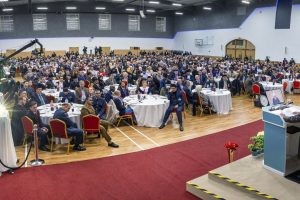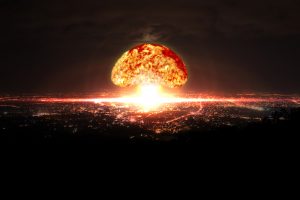Relief and Out of the Woods or Out of the Frying pan and into the Fire?

Zafir Malik, UK
To say that the year 2020 was ‘different’ is perhaps the biggest understatement ever. It has been a year like none other; dominated by the ongoing Coronavirus pandemic which has engulfed more than 180 countries of the world. [1] In the backdrop to this pandemic, 2020 witnessed both sides of humanity; the good and the ugly. The good in the form of the dedication and hard work by the frontline staff of each country, be they doctors, nurses, paramedic staff or essential workers, who put their own lives in danger to save and care for their fellow human beings. We then saw remarkable efforts by countless charities to assist the vulnerable through this difficult time. We even saw great personal endeavours to assist in the fight against the pandemic, notably Captain Sir Tom Moore, who walked 100 lengths of his garden for his 100th birthday, and managed to raise in excess of £32 million for the NHS.
On the flip side, we saw things that brought out the ugly side of humanity. Just one of the many heinous acts witnessed in this year was the horrific manner in which George Floyd, an African American man, was killed by Derek Chauvin, a white police officer, which sparked waves of protests across the world to fight inequality.
Undoubtedly, with the rollout of the vaccines for COVID-19, the world can finally see light at the end of a long and dark tunnel. However, the grey clouds have not quite been blown away just yet. The Coronavirus has had a devastating economic effect all over the world. In June, the IMF said the Coronavirus had ‘plunged the world into a crisis like no other.’ [2] It also said that the economic decline is the worst since the Great Depression of the 1930’s. [3] Anyone who studied GCSE History would recall that one question that always came up in exams; What role did the Great Depression play in causing World War 2? The link between the pandemic and a world war was highlighted in November by General Sir Nick Carter, Britain’s Chief of the Defence Staff in which he said that the ‘global economic crisis caused by the coronavirus pandemic could also trigger new security threats, even war.’ [4] The pandemic has hit all sectors of society, many businesses have gone bankrupt and redundancies have hit a record high. [5]
But even without the economic effects of the coronavirus, things around the world have been far from ‘rosy’. As the year 2020 dawned, a top Iranian general was killed in a drone strike under orders of the US President. [6] Following his death ‘World War III’ began trending on Twitter and many drew parallels between his killing and the assassination of Franz Ferdinand – the Archduke of the Austro-Hungarian Empire, whose killing in June 1914 sparked the beginning of World War I. [7] [8] Through the year, tensions grew in the South China Sea between China, neighbouring countries and the USA; the Middle East continued to be the hub of conflict with Saudi Arabia’s war in Yemen, causing 100,000 deaths since 2015 [9] and the ongoing Syrian crisis which has seen over 380,000 deaths in the past nine years. [10] In November, clashes between Pakistan and India over Kashmir left 13 dead and tensions escalated between two nuclear powers. Also in November, a top Iranian scientist was shot dead, with Iran blaming Israel for the killing and vowing to exact revenge for his assassination. All these incidents took place in spite of a once in a century pandemic engulfing the entire world. So with the Coronavirus out of the picture, what does the future hold? As Sir General Nick Carter put it, ‘the threat of a new world war is real’. [11]
This may have dawned on experts recently, but as an Ahmadi Muslim, we are well aware of this fact. His Holiness, Hazrat Mirza Masroor Ahmad (aba), Head of the Worldwide Ahmadiyya Muslim Community, has been addressing world leaders for the past decade, warning them of the threat posed by a world war. During the National UK Peace Symposium in 2012 held in London, His Holiness stated:
‘In today’s world, one terrifying manifestation of God’s Decree could be in the shape of another world war. There is no doubt that the effects of such a war and its destruction will not be limited to the war itself or even to this generation. In fact, its horrific consequences will be exhibited for many generations to come.’ [12]
In 2013, His Holiness addressed many dignitaries at a reception in California and said:
‘The direction the world is moving in suggests that the dark shadow of war is being cast over a very large part of the globe. If war breaks out then countless innocent women, children and elderly people will all die. The destruction will be greater than was witnessed in the previous two World Wars, and I say this knowing full well that during the Second World War, tens of millions of people lost their lives. The world’s population is now far greater and there has also been a vast increase in both the number of weapons of mass destruction and the countries that have developed a thirst for war. Under these circumstances, destruction will also be manifold.’ [13]

If war is the solution to mankind’s problems, then the world is heading in the right direction. Sadly, the only thing that war is good at is plunging the world into further darkness. Recent studies have shown that war and conflict situations cause more deaths and disability than any major disease. [14] As the official journal of the World Psychiatric Association put it:
‘War destroys communities and families and often disrupts the development of the social and economic fabric of nations. The effects of war include long-term physical and psychological harm to children and adults, as well as reduction in material and human capital. Death as a result of wars is simply the ‘tip of the iceberg’’. [15]
In each of his addresses, His Holiness has pinpointed the solution to all these problems we face; they are for mankind to recognise its creator and to deal with our fellow human beings with compassion and justice. This was the reason why the Holy Prophet (sa) came to this world and the reason for the advent of Hazrat Mirza Ghulam Ahmad (as), the Promised Messiah (as) of the latter days. Explaining the purpose of his advent, Hazrat Mirza Ghulam Ahmad (as) says:
‘The task with which God Almighty has appointed me is to remove the estrangement that has come between man and his Creator and re-establish a relationship of love and sincerity between him and his Lord.’ [16]
Indeed, over the past 100 years alone, mankind has made incredible advancements in the field of science, technology etc. With all this progress, it seems as though man can achieve ever new heights and there seems to no end to the avenues of advancement. Living in the 21st century with all the outstanding progress of mankind before us, the question arises: what is the need for God then? A microscopic virus has answered this question and exposed the frailties of man by bringing the world to its knees. Perhaps it is time we fell further into prostration and turn to God to request Him to save us from this affliction and the ever-increasing conflict around the world. The lesson we can learn from 2020 is the need to adopt the positive side of humanity; showing compassion for others and putting them first. In a nutshell, this is half of the teaching of Islam. The other half is fulfilling the rights owed to God through His worship and forging a connection with him. This is how millions of Ahmadis begin each year, by praying to God not only for ourselves but for all of humanity to recognise their creator and to make the world a better place to live for everyone. With these prayers, let us hope and pray that 2021 is nothing like the year gone by.

About the Author: Zafir Malik serves as the Associate Editor of The Review of Religions, having graduated from Jamia Ahmadiyya UK – Institute of Modern Languages and Theology. He is also an Imam of the Ahmadiyya Muslim Community and regularly appears as a panellist on MTA International and Voice of Islam radio station answering questions on Islam.
ENDNOTES
[1] https://www.pharmaceutical-technology.com/features/coronavirus-outbreak-the-countries-affected/
[2] https://www.bbc.co.uk/news/business-52273988
[3] ibid
[4] https://news.sky.com/story/risk-of-new-world-war-is-real-head-of-uk-armed-forces-warns-12126389
[5] https://www.theguardian.com/business/live/2020/dec/15/uk-redundancies-hit-record-high-as-covid-19-pushes-unemployment-up-business-live
[6] https://www.bbc.co.uk/news/world-middle-east-50979463
[7] https://www.standard.co.uk/news/world/why-world-war-3-trending-twitter-us-airstrike-iran-a4325646.html
[8] https://www.bbc.co.uk/news/newsbeat-50982073
[9] https://www.cfr.org/global-conflict-tracker/conflict/war-yemen
[10] https://www.france24.com/en/20200104-syria-death-toll-tops-380-000-in-almost-nine-year-war-monitor
[11] https://news.sky.com/story/risk-of-new-world-war-is-real-head-of-uk-armed-forces-warns-12126389
[12] Hazrat Mirza Masroor Ahmad, World Crisis and the Pathway to Peace, (Tilford, UK: International Publications Ltd. 2016) 50
[13] https://rorenglish.wpengine.com/9330/muhammad-sa-a-messenger-of-peace/
[14] https://www.ncbi.nlm.nih.gov/pmc/articles/PMC1472271/#:~:text=War%20destroys%20communities%20and%20families,in%20material%20and%20human%20capital.
[15] ibid
[16] Hazrat Mirza Ghulam Ahmad, Lecture Lahore, (Tilford, UK: Islam International Publications Ltd, 2008) 42




That was a wonderful article Zafir. It certainly is a frightening world but having your community in it makes me feel safer.